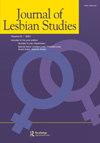Some Liked It and Some Did Not: (Re)Circulating Lesbian Culture Among Queer Generations.
IF 1.1
Q2 SOCIAL SCIENCES, INTERDISCIPLINARY
引用次数: 0
Abstract
Naming oneself, and claiming an identity and a community, depends largely upon how people define and represent themselves, and whether that self-definition and representation is accepted by, or legible to, others who inhabit different social positions based on age, gender, sexuality, and often generation. My aim is neither to rehabilitate the lesbian past or lesbian words for identity, nor to reject the increasingly broad use of the term queer. Rather, as a Generation X lesbian, I contend that lesbian culture, identity, and community continue to have much to offer for other categories of queerness that are similarly "untidy", contested, or less well-understood by the mainstream. Approaching lesbian history, culture, and identity as dynamic and complex broadens possibilities for who might find connection and belonging in a lesbian past and a queer future. I explore an eclectic lesbian archive with an intergenerational Canadian focus that centers lesbian identity, community, and representation. My analysis supports my assertion that lesbian and queer inheritance flow multi-directionally, across and among people of varied generations and different social locations. I further posit that far from being anachronistic, lesbian, as a term for identity and culture, and as a political project, has ongoing productive potential, vitality, and agility that exceeds generational or linear understandings due to its fundamental grounding in self-definition. (Re)circulating lesbian and queer culture, therefore, functions as intergenerational wealth, community building, and cultural memory, bridging past pleasures, knowledge, and affective attachments with present and future possibilities for living.有些人喜欢,有些人不喜欢:女同性恋文化在同性恋世代中(再)流传。
为自己命名,宣称自己的身份和社区,在很大程度上取决于人们如何定义和表述自己,以及这种自我定义和表述是否被其他人所接受,或是否能被其他人所辨识,因为这些人基于年龄、性别、性取向,往往还有世代而处于不同的社会地位。我的目的既不是要恢复女同性恋的过去或女同性恋的身份,也不是要拒绝日益广泛使用的 "同性恋者 "一词。相反,作为一名 X 代女同性恋,我认为女同性恋文化、身份和社群对其他类似 "不整洁"、有争议或不太被主流理解的同性恋类别仍有很大帮助。将女同性恋的历史、文化和身份看作是动态的、复杂的,拓宽了在女同性恋的过去和同性恋的未来中找到联系和归属的可能性。我探讨了一个不拘一格的女同性恋档案,该档案以加拿大跨代为重点,以女同性恋身份、社区和代表性为中心。我的分析支持了我的论断,即女同性恋和同性恋者的遗产是多向流动的,跨越不同世代和不同社会位置的人,并在他们之间流动。我进一步假设,女同性恋作为一种身份和文化术语,作为一项政治计划,远非过时,而是具有持续的生产潜力、生命力和灵活性,由于其根本立足于自我定义,因而超越了代际或线性的理解。(因此,(再)流通的女同性恋和同性恋文化具有代际财富、社区建设和文化记忆的功能,将过去的快乐、知识和情感依恋与现在和未来的生活可能性联系起来。
本文章由计算机程序翻译,如有差异,请以英文原文为准。
求助全文
约1分钟内获得全文
求助全文
来源期刊

Journal of Lesbian Studies
SOCIAL SCIENCES, INTERDISCIPLINARY-
CiteScore
2.20
自引率
9.10%
发文量
27
期刊介绍:
The Journal of Lesbian Studies examines the cultural, historical, and interpersonal impact of the lesbian experience on society, keeping all readers—professional, academic, or general—informed and up to date on current findings, resources, and community concerns. Independent scholars, professors, students, and lay people will find this interdisciplinary journal essential on the topic of lesbian studies!
 求助内容:
求助内容: 应助结果提醒方式:
应助结果提醒方式:


